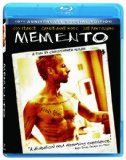| Reviews & Columns |
|
Reviews DVD TV on DVD Blu-ray 4K UHD International DVDs In Theaters Reviews by Studio Video Games Features Collector Series DVDs Easter Egg Database Interviews DVD Talk Radio Feature Articles Columns Anime Talk DVD Savant Horror DVDs The M.O.D. Squad Art House HD Talk Silent DVD
|
DVD Talk Forum |
|
|
| Resources |
|
DVD Price Search Customer Service #'s RCE Info Links |
|
Columns
|
|
|
Memento: 10th Anniversary Special Edition
Lionsgate Home Entertainment // R // February 22, 2011
List Price: $19.99 [Buy now and save at Amazon]
The Film:
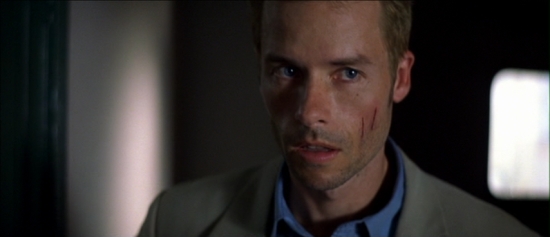
"I have this condition", Leonard Shelby (Guy Pearce) says in Memento as he explains why he's incapable of remembering people he's seen before. Caused by a violent house robbery that claimed his wife's life and damaged his brain, his condition leaves him unable to create new memories following the point of his attack, instead requiring him to use alternate methods of keeping important information at-hand. He now jots down notes on pieces of paper, takes pictures with a Polaroid camera, and gets pertinent details tattooed on his lanky body, all ingredients in his reconstruction of one of humanity's innate tools. But it begs the question: "If he's not able to create new memories, how is he able to tell people about his condition?" Some might see this as a quandary within writer/director Christopher Nolan's twisted plot, but, in fact, they've just reached the gateway to its more introspective and interpretive corridors.
Nolan's follow-up to his freshman dazzler Following is a diabolical, faultlessly-acted puzzle, one that uses Leonard's condition for its own fiendish purposes. In fractured bursts, with each current-time segment ending where the previous began, the script essentially follows his investigation "backwards" while navigating through the fleeting limitations of his memory -- thus emphasizing his naive confusion, which soon turns into ours. These fragments pop up amid black-and-white chronological footage that occurs at a different time, accompanied either by Leonard's narration explaining the components of his condition or scattered chats on the phone with an unnamed caller. The suspense lies in how these two sides will converge around the details, how the answers might tie to the enigmatic beginning, and why we're really supposed to remember Sammy Jankis -- a man Leonard once investigated for insurance fraud.
Leonard's murder investigation breaks free from the conventions of modern neo-noir due to its novel grasp on time, with Christopher Nolan's script side-stepping traditional whodunit trappings by focusing on his condition. The writing fleshes out Leonard's anterograde amnesia with deft perception of exactly which details to emphasize -- from the first moments when one of his Polaroids is seen "un-developing" an image of a bloodied corpse, to the gap between psychology and physiology -- and which should remain periphery secrets, essentially clues hidden in plain sight. It's as mesmerizing to watch Leonard's mania as it is cleverly constructed, which challenges the audience to digest why he can't feel fear and to comprehend how he recognizes hotel rooms, meeting locations, and the vehicle he drives. We sympathize with the guy and his duct-taped version of a rewarding life ... at first.
There's a lot to chew on, though, between the opening moments in Memento when we see Leonard exacting his revenge and the end credits. He attends a pre-set meeting with a questionable barmaid named Natalie (Carrie-Anne Moss), who tosses out a line about the two of them being "survivors" after dropping info in his lap about the killer. We learn about Natalie and Teddy (Joe Pantoliano), the man at the other end of Leonard's gun, as we backtrack through Leonard's fury of note-following, relying on stuff he scribbles on Polaroids -- Natalie will help Leonard "out of pity", while Teddy's picture simply has "Don't Believe His Lies" written underneath -- as solid details. Here's Memento's brave challenge: we arrive in the story after all his notes have been written, and we have little grasp on their context. It persuades us to trust this man who's essentially a machine that operates on instinct, with no grasp on perspective and no way of trusting anything except the facts that he himself captures. The ways that Nolan pivots around this suspiciousness are often gasp-worthy.
Memento constructs a dense maze out of its own untrustworthy devices, steeped in captivating mystery that uses its own explanations as building blocks for an almost nightmarish mood. Christopher Nolan's slick style and structural cohesiveness make certain to keep the material cogent when it could've been too erratic or confusing, his discerning craftsmanship weaving the parallel mysteries together with both an abrasive edge and calculated sophistication. That's part of the director's somewhat divisive method, where nearly every stick of material focuses on fleshing out Leonard's mentality and perception, instead provoking the viewer to filter their own emotional perspective into Leonard's struggle with his condition. By nature, then, Memento's cold and occasionally nihilistic (look to a nasty moment involving Natalie at the film's center for proof), but the first-class design challenges the mind with its structured pessimism, telegraphing a dark punch as it perplexes those willing to relish in its menacing demeanor.
And just as Memento allows us to think we're a step ahead in the byzantine plot, it makes us realize that we're actually a consistent step behind. On the surface, Leonard's experiences envelop a warped sense of time to create a painstaking cerebral sprint, one that asks a lot of its audience by only capturing what's in front of a brain-damaged, grieving man. The mystery moves quickly, nervously, and with purpose, while it also unearths heavy retrospection about the frailty of memories and the mourning process, asking how a man who can't feel time can heal after both physical and mental trauma. We're left unable to really answer his rhetorical question, but that's fine; the darkest of film noirs share similar traits, with a comparable mix of compassion and obscurity shaped by our own observation. It's the film's willingness to explore Leonard's own answer -- to get revenge for his wife's rape and murder, even without the ability to remember it -- that fuels the relentless suspense.
Yet as the layers peel away -- or, more appropriately, as the layers are glued back on -- it reveals that little can be trusted in this eerie, gripping mystery of the human condition. In that, Leonard's memory-stripped dysfunction becomes the most important character, one well worth mining on a deeper level. Some might look at the memory structure as nothing more than a novel way of telling a familiar story, and they wouldn't be completely wrong; however, the connectivity of his condition holds deeper, darker contemplations for the willing and industrious. Tracing back the roots of Leonard's vengeance becomes the central thrust to Christopher Nolan's indie, while dissecting the nature of Leonard's motivation deems it worthy of theoretical scrutiny. You'll be able to find the end of Memento's maze, but what's to be found at the end remains one of the key fascinations worth re-examining, and the primary reason why it's an unforgettable tour de force.
The Blu-ray:
Lionsgate, in their licensing deal with Sony that allows them to distribute Newmarket's catalogue, have brought Memento to Blu-ray in a new 10th Anniversary Special Edition package, on the heels of the Academy Award nominations for Inception. It arrives as a standard-fare silver-topped disc, enclosed in a standard eco-aware case with a Lionsgate advertisement slipped in the package. As much fun as the Limited Edition's mind-rattling menu design could be, this release has thankfully opted away from a complex design, instead going towards Lionsgate's standard interface -- options at the bottom of the screen, with an expanded menu bar on the left-hand side. Don't take that to mean that this design's lacking in polish; the mix of Polaroid shots from the film, the hazy semi-3D production shots, and the textured backing take a stylish and fitting approach. With the sounds of a camera snapping in the background, it's obvious that there's no lack of polish in this budget release.
Video and Audio:
Everything you've heard about the original Sony Blu-ray release of Memento -- both positive and negative -- is correct. It's the very definition of erratic; some questioned the noise present in the transfer as being overly heavy as others pondered its authenticity to the filming style, while neither can question that it contains extensive dust and debris. Contained on a single-layer disc as one of the initial catalogue releases on the format from the company, the mix didn't really offer due-diligence to either its grain structure or its accuracy of coloring. In comes Lionsgate's budget-priced anniversary release, which arrives with a "director-approved" transfer that Nolan supervised himself. To say that the results are impressive would be a vast understatement, as this brand-new, extremely clean treatment looks like a picture that Wally Pfistor and Nolan might've shot yesterday, on film. I'm stunned at the improvement.
The first thing that'll stand out from Lionsgate's 2.35:1 1080p AVC encode is the difference in color. Flesh tones are far more robust and convincing, while the background details carry much more welcoming levels of saturation. Contrast errs towards a stylish, satisfying balance, with the grayish wash-out problems from the previous release completely eradicated. That's not to say it looks false, but much closer to what would be expected from the cinematography -- and the cinematographer's style. Additionally, the elements under question with the previous release have also been appropriately addressed, with both the color and black-and-white footage latching onto its 35mm roots with plenty of stability and appropriate-looking grain. On top of that, textures and minor details are razor-sharp -- seen in Pearce's stubble, the tattoos, his notes, weave in the Polaroids, etc. -- and show a vast, staggering uptick over the previous release.
Audio also receives a boost in the form of a DTS HD Master Audio track, one that easily bests the uncompressed PCM track from the previous release. The original track held its own in regards to dialogue balance, clarity, and cleanliness, but this new track takes it a step much, much further. Dynamic sound effects -- such Leonard's car driving across gravel and the broken car window shattered by a gun shot -- ricochet to the rear channels with robust, astounding clarity, spreading across th entire soundstage with a level of unexpected punch. Dialogue, the film's bread-'n-butter, has been delightfully boosted to richer levels, consistently more audible yet never sounding false. David Julyan's moody, pulse-heavy scoring rides along the lower-frequency channel with a spry mix of bass thump and accurate bounce, while the sweeping emotional crescendos really sweep across the entire width of the sound design. Put simply, it sounds marvelous, probably better than the theatrical audio showings. Subtitle options arrive in optional English SDH and Spanish language options to accompany the sole English Master Audio language track.
Special Features:
Lionsgate have gone an intelligent route with this anniversary presentation of Memento, opting to include the pertinent special features and a brand-new audiovisual treatment at a low price tag. "Pertinent" in this case actually means an extensive array of supplements from the original release, concentrating instead on getting the film in more Blu-ray owners' hands with a sharp new treatment. The only new special feature in this collection is the Remembering Memento (7:44, HD AVC) interview with Christopher Nolan, where he discusses a bit of the history of the film and his concentrating on its style of narrative. He also tosses out some other widely-known bits of trivia, such as the twenty-five (25) day shooting schedule. He also addresses its ambiguity, and how he's very aware that there's a fine line between interpretation and vagueness.
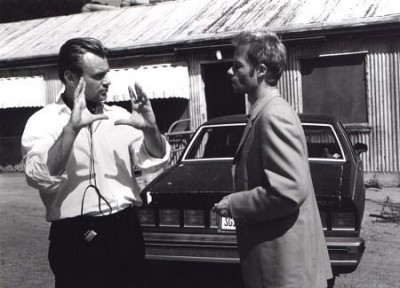 The rest of the supplements come from Sony's previous releases, both the Limited Edition DVD and the original Blu-ray that came with a few ported features. The Audio Commentary with Christopher Nolan remains the same one used previously, an understated track with the Brit director that follows at a muted but insightful rhythm scene-by-scene. He discusses setting up specific scenes, the importance of capturing the "Sammy Jankis" tattoo, Guy Pearce's performance, and some of the film's deeper context, only periodically falling into "narrator" mode by describing what's happening on-screen. The Sundance Channel Anatomy of a Scene (25:15, SD MPEG-2) piece makes a return, with sincerely enlightening cast/crew interviews mixed in with split-screen analysis, pages from the script, and full-on spurts from the film, while the Elvis Mitchell-led IFC Interview with Christopher Nolan (23:51, SD MPEG-2) takes a deeper, conversational glimpse at the film with the director.
The rest of the supplements come from Sony's previous releases, both the Limited Edition DVD and the original Blu-ray that came with a few ported features. The Audio Commentary with Christopher Nolan remains the same one used previously, an understated track with the Brit director that follows at a muted but insightful rhythm scene-by-scene. He discusses setting up specific scenes, the importance of capturing the "Sammy Jankis" tattoo, Guy Pearce's performance, and some of the film's deeper context, only periodically falling into "narrator" mode by describing what's happening on-screen. The Sundance Channel Anatomy of a Scene (25:15, SD MPEG-2) piece makes a return, with sincerely enlightening cast/crew interviews mixed in with split-screen analysis, pages from the script, and full-on spurts from the film, while the Elvis Mitchell-led IFC Interview with Christopher Nolan (23:51, SD MPEG-2) takes a deeper, conversational glimpse at the film with the director.
Along with those features, several of the text/visual based portions from previous editions also make an appearance on the Blu-ray. Jonathan Nolan's Short Story, "Memento Mori" has been included, in white text against the same backdrop that adorns the in-film access menu. The font's of a great size for any television or monitor, in very legible and clean font that makes the experience of reading his clever story a pleasant one. The Tattoo Sketches visual diagram spreads all the way across the screen, one half with the full-body diagram and the other side with a white sheet that includes all the stencils, while the Leonard's Journal appears in messy scribbles that border on the illegible in this page-by-page, minuscule format. Rounding things out are the disc's Bookmark Capabilities and several other previews from Lionsgate.
What's Not Here?
Unfortunately, a few things of note haven't been carried over from the original Sony Limited Edition DVD that might cause someone to hold onto that particular release. First, the Chronological Edit Cut can't be found anywhere on this Blu-ray; if it's on there, multiple easter-egg hunts with the remote couldn't locate it. Nolan's Shooting Script also hasn't been ported over for this release, nor have all the Production Stills and Sketches (though many/most of these can be seen in the Remembering Memento interview). These features don't bug me as much, since they really only need to be viewed once or twice for their full effect; however, Lionsgate have also neglected to add either of the Theatrical Trailers, leaving this release trailer-less. At $20, however, it's a marginal hit that doesn't color the overall impressions left with this better-than-expected presentation. Just hold on to the flip-open clipboard set, as if that needed to be said.
Final Thoughts:
Christopher Nolan's Memento takes a familiar premise -- a whodunit procedural involving the investigation of a rape and murder -- and turns it completely around. Literally. The way in which Nolan interweaves each twist and turn seamlessly through Leonard's memory condition still boggles the mind, in creation of a chilling, suspenseful jigsaw puzzle that's self-aware of its layers yet aggressive in execution. Through its machinations, it also taps into a vein of contemplative potency, using all the clues and explorations of the darker side of humanity to lengths that some could even consider "soul-searching" -- tying in grief, memory, and the way we see the world into a poignant mix. Mostly, it delivers a shot to the gut every time I see everything interlock so perfectly, holding its superb edge through many, many screenings -- all of which leave me on the end of my seat and chomping at my fingernails. It's a personal favorite, and has remained so for roughly eight-or-so years now.
Lionsgate have taken the opportunity to go back in and deliver a much-needed upgrade over the original Sony release of Memento, releasing this as a 10th Anniversary Special Edition. The audiovisual improvement, safe to say, makes the purchase in itself worth the money; the Nolan-supervised transfer towers high above its rickety single-layered Blu-ray counterpart, while the audio also sees marked improvement in the transition to a new Master Audio track. On top of that, a healthy number of special features also adorn the disc, including the familiar commentary, the Sundance and IFC interview/assembly featurettes, and other textual goodies available across its other assorted releases. The high-definition improvement, inclusion of the lion's share of extras, and the remarkable price tag (don't tell Lionsgate, but it's worth well more than the $20 list price), this one's a no-brainer for, well, everybody.
DVDTalk Collector's Series. It's an early contender for release of the year.
Note: Screenshots in this review are from Sony's Limited Edition DVD presentation, and do not represent the quality of the Blu-ray reviewed here.
Thomas Spurlin, Staff Reviewer -- DVDTalk Reviews | Personal Blog/Site

"I have this condition", Leonard Shelby (Guy Pearce) says in Memento as he explains why he's incapable of remembering people he's seen before. Caused by a violent house robbery that claimed his wife's life and damaged his brain, his condition leaves him unable to create new memories following the point of his attack, instead requiring him to use alternate methods of keeping important information at-hand. He now jots down notes on pieces of paper, takes pictures with a Polaroid camera, and gets pertinent details tattooed on his lanky body, all ingredients in his reconstruction of one of humanity's innate tools. But it begs the question: "If he's not able to create new memories, how is he able to tell people about his condition?" Some might see this as a quandary within writer/director Christopher Nolan's twisted plot, but, in fact, they've just reached the gateway to its more introspective and interpretive corridors.
Nolan's follow-up to his freshman dazzler Following is a diabolical, faultlessly-acted puzzle, one that uses Leonard's condition for its own fiendish purposes. In fractured bursts, with each current-time segment ending where the previous began, the script essentially follows his investigation "backwards" while navigating through the fleeting limitations of his memory -- thus emphasizing his naive confusion, which soon turns into ours. These fragments pop up amid black-and-white chronological footage that occurs at a different time, accompanied either by Leonard's narration explaining the components of his condition or scattered chats on the phone with an unnamed caller. The suspense lies in how these two sides will converge around the details, how the answers might tie to the enigmatic beginning, and why we're really supposed to remember Sammy Jankis -- a man Leonard once investigated for insurance fraud.
Leonard's murder investigation breaks free from the conventions of modern neo-noir due to its novel grasp on time, with Christopher Nolan's script side-stepping traditional whodunit trappings by focusing on his condition. The writing fleshes out Leonard's anterograde amnesia with deft perception of exactly which details to emphasize -- from the first moments when one of his Polaroids is seen "un-developing" an image of a bloodied corpse, to the gap between psychology and physiology -- and which should remain periphery secrets, essentially clues hidden in plain sight. It's as mesmerizing to watch Leonard's mania as it is cleverly constructed, which challenges the audience to digest why he can't feel fear and to comprehend how he recognizes hotel rooms, meeting locations, and the vehicle he drives. We sympathize with the guy and his duct-taped version of a rewarding life ... at first.
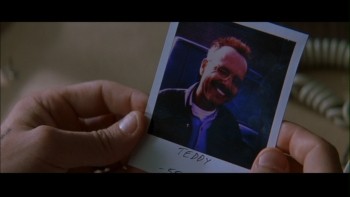 |  |
There's a lot to chew on, though, between the opening moments in Memento when we see Leonard exacting his revenge and the end credits. He attends a pre-set meeting with a questionable barmaid named Natalie (Carrie-Anne Moss), who tosses out a line about the two of them being "survivors" after dropping info in his lap about the killer. We learn about Natalie and Teddy (Joe Pantoliano), the man at the other end of Leonard's gun, as we backtrack through Leonard's fury of note-following, relying on stuff he scribbles on Polaroids -- Natalie will help Leonard "out of pity", while Teddy's picture simply has "Don't Believe His Lies" written underneath -- as solid details. Here's Memento's brave challenge: we arrive in the story after all his notes have been written, and we have little grasp on their context. It persuades us to trust this man who's essentially a machine that operates on instinct, with no grasp on perspective and no way of trusting anything except the facts that he himself captures. The ways that Nolan pivots around this suspiciousness are often gasp-worthy.
Memento constructs a dense maze out of its own untrustworthy devices, steeped in captivating mystery that uses its own explanations as building blocks for an almost nightmarish mood. Christopher Nolan's slick style and structural cohesiveness make certain to keep the material cogent when it could've been too erratic or confusing, his discerning craftsmanship weaving the parallel mysteries together with both an abrasive edge and calculated sophistication. That's part of the director's somewhat divisive method, where nearly every stick of material focuses on fleshing out Leonard's mentality and perception, instead provoking the viewer to filter their own emotional perspective into Leonard's struggle with his condition. By nature, then, Memento's cold and occasionally nihilistic (look to a nasty moment involving Natalie at the film's center for proof), but the first-class design challenges the mind with its structured pessimism, telegraphing a dark punch as it perplexes those willing to relish in its menacing demeanor.
 | 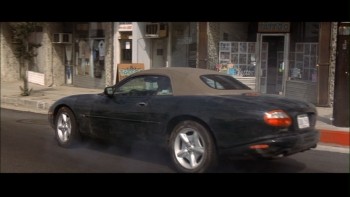 |
And just as Memento allows us to think we're a step ahead in the byzantine plot, it makes us realize that we're actually a consistent step behind. On the surface, Leonard's experiences envelop a warped sense of time to create a painstaking cerebral sprint, one that asks a lot of its audience by only capturing what's in front of a brain-damaged, grieving man. The mystery moves quickly, nervously, and with purpose, while it also unearths heavy retrospection about the frailty of memories and the mourning process, asking how a man who can't feel time can heal after both physical and mental trauma. We're left unable to really answer his rhetorical question, but that's fine; the darkest of film noirs share similar traits, with a comparable mix of compassion and obscurity shaped by our own observation. It's the film's willingness to explore Leonard's own answer -- to get revenge for his wife's rape and murder, even without the ability to remember it -- that fuels the relentless suspense.
Yet as the layers peel away -- or, more appropriately, as the layers are glued back on -- it reveals that little can be trusted in this eerie, gripping mystery of the human condition. In that, Leonard's memory-stripped dysfunction becomes the most important character, one well worth mining on a deeper level. Some might look at the memory structure as nothing more than a novel way of telling a familiar story, and they wouldn't be completely wrong; however, the connectivity of his condition holds deeper, darker contemplations for the willing and industrious. Tracing back the roots of Leonard's vengeance becomes the central thrust to Christopher Nolan's indie, while dissecting the nature of Leonard's motivation deems it worthy of theoretical scrutiny. You'll be able to find the end of Memento's maze, but what's to be found at the end remains one of the key fascinations worth re-examining, and the primary reason why it's an unforgettable tour de force.
The Blu-ray:
 | 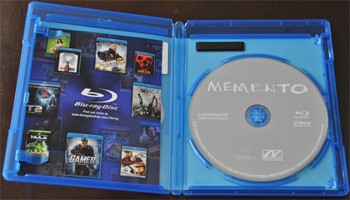 |
Lionsgate, in their licensing deal with Sony that allows them to distribute Newmarket's catalogue, have brought Memento to Blu-ray in a new 10th Anniversary Special Edition package, on the heels of the Academy Award nominations for Inception. It arrives as a standard-fare silver-topped disc, enclosed in a standard eco-aware case with a Lionsgate advertisement slipped in the package. As much fun as the Limited Edition's mind-rattling menu design could be, this release has thankfully opted away from a complex design, instead going towards Lionsgate's standard interface -- options at the bottom of the screen, with an expanded menu bar on the left-hand side. Don't take that to mean that this design's lacking in polish; the mix of Polaroid shots from the film, the hazy semi-3D production shots, and the textured backing take a stylish and fitting approach. With the sounds of a camera snapping in the background, it's obvious that there's no lack of polish in this budget release.
Video and Audio:
Everything you've heard about the original Sony Blu-ray release of Memento -- both positive and negative -- is correct. It's the very definition of erratic; some questioned the noise present in the transfer as being overly heavy as others pondered its authenticity to the filming style, while neither can question that it contains extensive dust and debris. Contained on a single-layer disc as one of the initial catalogue releases on the format from the company, the mix didn't really offer due-diligence to either its grain structure or its accuracy of coloring. In comes Lionsgate's budget-priced anniversary release, which arrives with a "director-approved" transfer that Nolan supervised himself. To say that the results are impressive would be a vast understatement, as this brand-new, extremely clean treatment looks like a picture that Wally Pfistor and Nolan might've shot yesterday, on film. I'm stunned at the improvement.
The first thing that'll stand out from Lionsgate's 2.35:1 1080p AVC encode is the difference in color. Flesh tones are far more robust and convincing, while the background details carry much more welcoming levels of saturation. Contrast errs towards a stylish, satisfying balance, with the grayish wash-out problems from the previous release completely eradicated. That's not to say it looks false, but much closer to what would be expected from the cinematography -- and the cinematographer's style. Additionally, the elements under question with the previous release have also been appropriately addressed, with both the color and black-and-white footage latching onto its 35mm roots with plenty of stability and appropriate-looking grain. On top of that, textures and minor details are razor-sharp -- seen in Pearce's stubble, the tattoos, his notes, weave in the Polaroids, etc. -- and show a vast, staggering uptick over the previous release.
Audio also receives a boost in the form of a DTS HD Master Audio track, one that easily bests the uncompressed PCM track from the previous release. The original track held its own in regards to dialogue balance, clarity, and cleanliness, but this new track takes it a step much, much further. Dynamic sound effects -- such Leonard's car driving across gravel and the broken car window shattered by a gun shot -- ricochet to the rear channels with robust, astounding clarity, spreading across th entire soundstage with a level of unexpected punch. Dialogue, the film's bread-'n-butter, has been delightfully boosted to richer levels, consistently more audible yet never sounding false. David Julyan's moody, pulse-heavy scoring rides along the lower-frequency channel with a spry mix of bass thump and accurate bounce, while the sweeping emotional crescendos really sweep across the entire width of the sound design. Put simply, it sounds marvelous, probably better than the theatrical audio showings. Subtitle options arrive in optional English SDH and Spanish language options to accompany the sole English Master Audio language track.
Special Features:
Lionsgate have gone an intelligent route with this anniversary presentation of Memento, opting to include the pertinent special features and a brand-new audiovisual treatment at a low price tag. "Pertinent" in this case actually means an extensive array of supplements from the original release, concentrating instead on getting the film in more Blu-ray owners' hands with a sharp new treatment. The only new special feature in this collection is the Remembering Memento (7:44, HD AVC) interview with Christopher Nolan, where he discusses a bit of the history of the film and his concentrating on its style of narrative. He also tosses out some other widely-known bits of trivia, such as the twenty-five (25) day shooting schedule. He also addresses its ambiguity, and how he's very aware that there's a fine line between interpretation and vagueness.
 The rest of the supplements come from Sony's previous releases, both the Limited Edition DVD and the original Blu-ray that came with a few ported features. The Audio Commentary with Christopher Nolan remains the same one used previously, an understated track with the Brit director that follows at a muted but insightful rhythm scene-by-scene. He discusses setting up specific scenes, the importance of capturing the "Sammy Jankis" tattoo, Guy Pearce's performance, and some of the film's deeper context, only periodically falling into "narrator" mode by describing what's happening on-screen. The Sundance Channel Anatomy of a Scene (25:15, SD MPEG-2) piece makes a return, with sincerely enlightening cast/crew interviews mixed in with split-screen analysis, pages from the script, and full-on spurts from the film, while the Elvis Mitchell-led IFC Interview with Christopher Nolan (23:51, SD MPEG-2) takes a deeper, conversational glimpse at the film with the director.
The rest of the supplements come from Sony's previous releases, both the Limited Edition DVD and the original Blu-ray that came with a few ported features. The Audio Commentary with Christopher Nolan remains the same one used previously, an understated track with the Brit director that follows at a muted but insightful rhythm scene-by-scene. He discusses setting up specific scenes, the importance of capturing the "Sammy Jankis" tattoo, Guy Pearce's performance, and some of the film's deeper context, only periodically falling into "narrator" mode by describing what's happening on-screen. The Sundance Channel Anatomy of a Scene (25:15, SD MPEG-2) piece makes a return, with sincerely enlightening cast/crew interviews mixed in with split-screen analysis, pages from the script, and full-on spurts from the film, while the Elvis Mitchell-led IFC Interview with Christopher Nolan (23:51, SD MPEG-2) takes a deeper, conversational glimpse at the film with the director. Along with those features, several of the text/visual based portions from previous editions also make an appearance on the Blu-ray. Jonathan Nolan's Short Story, "Memento Mori" has been included, in white text against the same backdrop that adorns the in-film access menu. The font's of a great size for any television or monitor, in very legible and clean font that makes the experience of reading his clever story a pleasant one. The Tattoo Sketches visual diagram spreads all the way across the screen, one half with the full-body diagram and the other side with a white sheet that includes all the stencils, while the Leonard's Journal appears in messy scribbles that border on the illegible in this page-by-page, minuscule format. Rounding things out are the disc's Bookmark Capabilities and several other previews from Lionsgate.
What's Not Here?
Unfortunately, a few things of note haven't been carried over from the original Sony Limited Edition DVD that might cause someone to hold onto that particular release. First, the Chronological Edit Cut can't be found anywhere on this Blu-ray; if it's on there, multiple easter-egg hunts with the remote couldn't locate it. Nolan's Shooting Script also hasn't been ported over for this release, nor have all the Production Stills and Sketches (though many/most of these can be seen in the Remembering Memento interview). These features don't bug me as much, since they really only need to be viewed once or twice for their full effect; however, Lionsgate have also neglected to add either of the Theatrical Trailers, leaving this release trailer-less. At $20, however, it's a marginal hit that doesn't color the overall impressions left with this better-than-expected presentation. Just hold on to the flip-open clipboard set, as if that needed to be said.
Final Thoughts:
Christopher Nolan's Memento takes a familiar premise -- a whodunit procedural involving the investigation of a rape and murder -- and turns it completely around. Literally. The way in which Nolan interweaves each twist and turn seamlessly through Leonard's memory condition still boggles the mind, in creation of a chilling, suspenseful jigsaw puzzle that's self-aware of its layers yet aggressive in execution. Through its machinations, it also taps into a vein of contemplative potency, using all the clues and explorations of the darker side of humanity to lengths that some could even consider "soul-searching" -- tying in grief, memory, and the way we see the world into a poignant mix. Mostly, it delivers a shot to the gut every time I see everything interlock so perfectly, holding its superb edge through many, many screenings -- all of which leave me on the end of my seat and chomping at my fingernails. It's a personal favorite, and has remained so for roughly eight-or-so years now.
Lionsgate have taken the opportunity to go back in and deliver a much-needed upgrade over the original Sony release of Memento, releasing this as a 10th Anniversary Special Edition. The audiovisual improvement, safe to say, makes the purchase in itself worth the money; the Nolan-supervised transfer towers high above its rickety single-layered Blu-ray counterpart, while the audio also sees marked improvement in the transition to a new Master Audio track. On top of that, a healthy number of special features also adorn the disc, including the familiar commentary, the Sundance and IFC interview/assembly featurettes, and other textual goodies available across its other assorted releases. The high-definition improvement, inclusion of the lion's share of extras, and the remarkable price tag (don't tell Lionsgate, but it's worth well more than the $20 list price), this one's a no-brainer for, well, everybody.
DVDTalk Collector's Series. It's an early contender for release of the year.
Note: Screenshots in this review are from Sony's Limited Edition DVD presentation, and do not represent the quality of the Blu-ray reviewed here.
|
| Popular Reviews |
| Sponsored Links |
|
|
| Sponsored Links |
|
|
| Release List | Reviews | Shop | Newsletter | Forum | DVD Giveaways | Blu-Ray | Advertise |
|
Copyright 2024 DVDTalk.com All Rights Reserved. Legal Info, Privacy Policy, Terms of Use,
Manage Preferences,
Your Privacy Choices | |||||||









